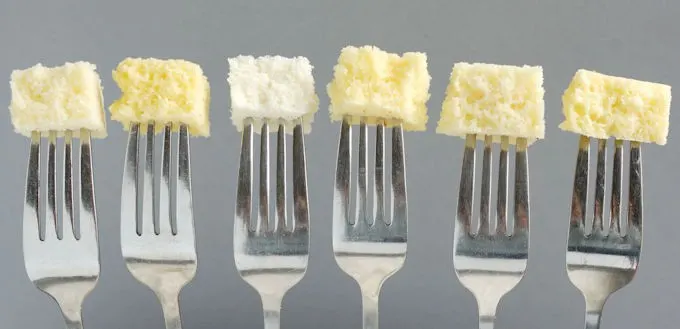The Science of Eggs in Baking
It’s not really possible to overstate how important the simple chicken egg is in the kitchen. Eggs are the base for a myriad of dishes, from rich custards to ethereal meringues.
Eggs can be scrambled, fried or poached for a nutritious meal. The yolk emulsifies mayonnaise and the white is indispensable for the pastry chef’s glue, royal icing.
In fact, the egg holds such culinary importance it is said that each of the 100 folds of a chef’s toque represents one way the chef can cook an egg.

Egg Science:
An egg’s culinary superpower comes from the way its proteins bond together.
Eggs are comprised mostly of water, with protein molecules dispersed throughout. The water molecules outnumber the protein molecules 1000 to 1.
In a raw egg, the proteins take the form of long chains that are folded onto themselves and are dispersed among the many water molecules, so a raw egg flows as a liquid. Picture individual knotted up rubber bands floating in a liquid.
When an egg is heated, salted, comes in contact with an acid, or is whipped into a foam, the protein chains break the bonds that form the compacted shapes, open up, then form new bonds.
Now imagine those knotted up rubber bands unwinding and grabbing onto each other to form a solid mass. This creates a three dimensional network of proteins that trap the water.
The trapped water is unable to flow so the egg becomes a solid.
The difference between Egg Whites & Egg Yolks
- Egg Yolks: There is more to an egg than just water and protein, especially within the yolk. The yolk is about a third of a shelled egg’s weight. It packs a load of nutrition and most of the calories. The yolk is comprised mostly of water and protein, but also some fat and lecithin. It’s the lecithin that gives the yolk it’s emulsifying powers.
- Egg whites: The white is about two thirds of an egg’s weight and is about 90% water. The remaining 10% is made up of protein and traces of vitamins, minerals, and glucose. Unlike the yolk, egg whites have no fat, so they don’t add richness like a yolk does. But egg whites have great capacity to create structure.
How long do eggs stay fresh?
The very design of an egg, with it’s protective shell, allows it remain fresh for several weeks in the refrigerator.
Although the egg will be edible for several weeks, the contents of the shell becomes more alkaline (less acidic) over time.
As the egg white becomes more alkaline, the albumin proteins repel each other which makes the white more runny and clear in appearance.
To judge the freshness of an egg crack it onto a plate and look at how it spreads. A fresh egg will have a white that looks plump and thickly clings to the yolk. An older egg white will be runny and spread across the plate.
Because of the change in the protein, older whites will whip faster and get slightly more volume. But fresh whites whip up to a more stable foam. This is why fresher whites are better for egg foam cakes since a more stable foam can rise higher.
As the egg ages, the yolk will take in water from the egg white. As the yolk takes in water the membrane surrounding the yolk stretches and weakens. The weakened yolk membrane can make older eggs are very difficult to separate without breaking the yolk.
Even an unbroken egg will loose moisture as it ages because the shell is slightly porous. Loss of moisture causes the egg contents to shrink and the air cell at the wide end of the shell expands.
To test the freshness of an unbroken egg place it in a bowl of water. A fresh egg will sink because the air cell is very small. An older egg will sit higher in the water due to the expanded air cell. A very old egg will float at the top of the water.
How to Store Eggs:
- Eggs will deteriorate 4 times faster at room temperature than under proper refrigeration.
- Kept in an airtight container in the refrigerator, eggs will stay fresh for several weeks.
- Once they’re out of the shell they should be used right away or frozen.
Can raw eggs be frozen?
- Egg whites can be frozen in a tightly covered container for up to 3 months.
- Egg yolks should be mixed with sugar or salt before freezing to preserve their texture. Use 1/2 teaspoon of salt or 1 1/2 teaspoons of sugar for each cup of yolks.
- To freeze whole eggs add 1/4 teaspoon salt or 3/4 teaspoon sugar per cup.


I read your other article on eggs as well. What do you think the difference would be in a cake made with whipped whites vs whipped whole eggs, if any? I am making a cake that needs to be refrigerated, so I want to use oil instead of butter. I know that whipping whole eggs will give it a finer crumb like a butter cake. I am so used to the reverse cream method but I would like to branch out to tweak my results. TIA!
I can’t say without referring to a specific recipe.
So if I’m trying to add fruits or fruit purée or liquid flavoring, how much liquid I need to take out to replace with the purée?
Hi Vanessa, I suggest you read through my post about Creating a Cake Recipe discusses how to change out ingredients in a recipe. In short, you can add liquid to a recipe, weather it’s milk, fruit puree, etc. You may have to switch out either some of the other liquid, depending on the recipe that you’re starting with or maybe change the number of eggs/yolks in the recipe. I have a Facebook Group for working on recipes. Just ask to join and I’ll add you to the group. You can post the recipe you’re working with and we can help you sort it out.